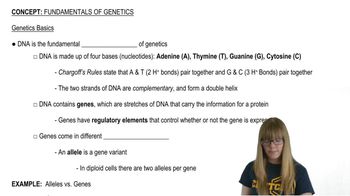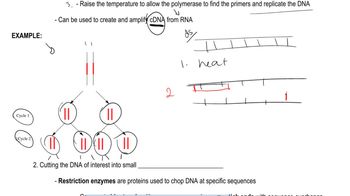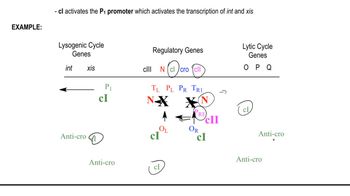Which of the following methods is used to study protein interactions in live cells?
Table of contents
- 1. Introduction to Genetics51m
- 2. Mendel's Laws of Inheritance3h 37m
- 3. Extensions to Mendelian Inheritance2h 41m
- 4. Genetic Mapping and Linkage2h 28m
- 5. Genetics of Bacteria and Viruses1h 21m
- 6. Chromosomal Variation1h 48m
- 7. DNA and Chromosome Structure56m
- 8. DNA Replication1h 10m
- 9. Mitosis and Meiosis1h 34m
- 10. Transcription1h 0m
- 11. Translation58m
- 12. Gene Regulation in Prokaryotes1h 19m
- 13. Gene Regulation in Eukaryotes44m
- 14. Genetic Control of Development44m
- 15. Genomes and Genomics1h 50m
- 16. Transposable Elements47m
- 17. Mutation, Repair, and Recombination1h 6m
- 18. Molecular Genetic Tools19m
- 19. Cancer Genetics29m
- 20. Quantitative Genetics1h 26m
- 21. Population Genetics50m
- 22. Evolutionary Genetics29m
15. Genomes and Genomics
Functional Genomics
Problem 3
Textbook Question
Discuss the similarities and differences between forward and reverse genetic approaches, and when you would choose to utilize each of the approaches.
 Verified step by step guidance
Verified step by step guidance1
Forward genetics begins with a phenotype (observable trait) and works to identify the gene or genetic mutation responsible for that phenotype. Reverse genetics, on the other hand, starts with a known gene and investigates its function by observing the phenotypic effects of altering or disrupting that gene.
In forward genetics, random mutagenesis is often used to induce mutations, and then individuals with the desired phenotype are identified and studied. In reverse genetics, techniques such as gene knockout, RNA interference (RNAi), or CRISPR-Cas9 are employed to specifically target and modify the gene of interest.
Forward genetics is particularly useful when the genetic basis of a trait is unknown, as it allows researchers to discover new genes involved in a biological process. Reverse genetics is chosen when the gene of interest is already identified, and the goal is to understand its specific role or function.
A similarity between the two approaches is that both aim to establish a connection between genes and phenotypes, contributing to our understanding of genetic function and regulation.
You would choose forward genetics when studying a novel phenotype or process without prior knowledge of the genes involved. Reverse genetics is more appropriate when you have a specific gene in mind and want to explore its role in a particular biological context.
 Verified video answer for a similar problem:
Verified video answer for a similar problem:This video solution was recommended by our tutors as helpful for the problem above
Video duration:
3mPlay a video:
Was this helpful?
Key Concepts
Here are the essential concepts you must grasp in order to answer the question correctly.
Forward Genetics
Forward genetics is an experimental approach that starts with a phenotype (observable traits) and works towards identifying the underlying genetic basis. Researchers typically induce mutations using chemicals or radiation and then screen for individuals with desired traits. This method is useful for discovering new genes and understanding their functions in biological processes.
Recommended video:
Guided course

Genetics Basics
Reverse Genetics
Reverse genetics, in contrast, begins with a known gene and seeks to determine its function by analyzing the phenotypic effects of specific gene modifications. Techniques such as gene knockout or RNA interference are commonly employed to disrupt gene function. This approach is particularly valuable for studying the roles of specific genes in development, disease, and other biological phenomena.
Recommended video:
Guided course

Genetic Cloning
Choosing Between Approaches
The choice between forward and reverse genetics depends on the research question and the available knowledge. Forward genetics is ideal for exploring unknown genetic pathways and discovering new genes, while reverse genetics is suited for investigating the function of specific genes when their sequences are already known. Understanding the context and goals of the study will guide researchers in selecting the most appropriate method.
Recommended video:
Guided course

Decision Between Lytic and Lysogenic Cycles
Related Videos
Related Practice
Multiple Choice
341
views
1
rank


